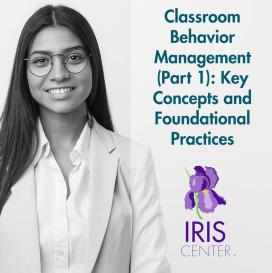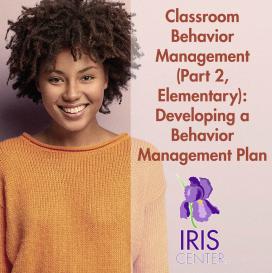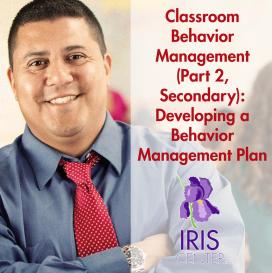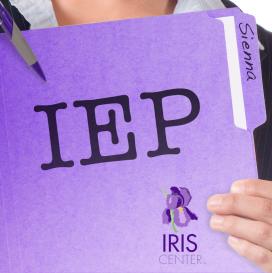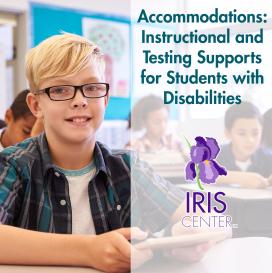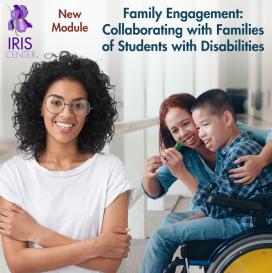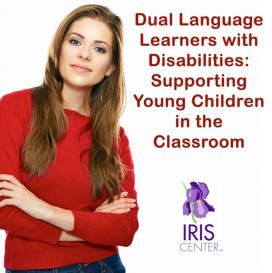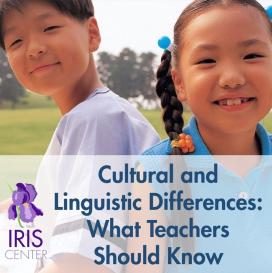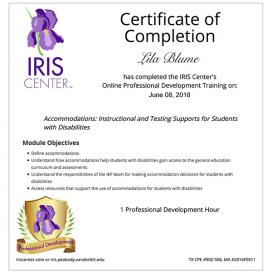The IRIS Center
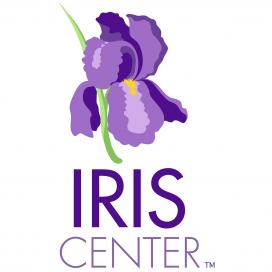
Peabody College, Vanderbilt University Box 275
Nashville, TN 37203
United States
Supported by the U.S. Department of Education’s Office of Special Education Programs and located at Vanderbilt University’s Peabody College, the IRIS Center develops and disseminates free, engaging online resources about evidence-based instructional and behavioral practices to support the education of all students, particularly struggling learners and those with disabilities. These resources, designed to bridge the research-to-practice gap, are intended for use in college teacher preparation programs, in professional development (PD) activities for practicing professionals, and by independent learners. The array of IRIS resources includes modules, case studies, information briefs, course/PD activities, parent tip sheets, a high-leverage practices alignment tool, and an online glossary of disability-related terms as well as supporting products to enhance IRIS use in coursework and PD activities.
Developed in collaboration with nationally recognized researchers and education experts, our free online resources address instructional and classroom issues of critical importance to today’s educators: classroom behavior management, working with culturally and linguistically diverse students, high-quality IEPs, secondary transition, Universal Design for Learning (UDL), differentiated instruction, and many others.
In addition to our free resources, IRIS offers online professional development options, including Certificates of Completion for IRIS Modules. Since 2001, IRIS resources have been used in teacher preparation programs throughout the United States and around the world. In 2021 alone, the IRIS Website hosted approximately four million visits.
Sponsored Content
This self-paced module overviews important key concepts and foundational practices related to effective classroom behavior management, including cultural influences on behavior, the creation of positive climates and structured classrooms.
Developed specifically with primary and intermediate elementary teachers in mind (e.g., K-5th grade), this module reviews the major components of a classroom behavior management plan (including rules, procedures, and consequences) and guides users through the steps of creating their own classroom behavior management plan.
Developed specifically with middle and high school teachers in mind (e.g., 6th-12th grade), this module reviews the major components of a classroom behavior management plan (including rules, procedures, and consequences) and guides users through the steps of creating their own classroom behavior management plan.
This interactive module details the process of developing high-quality individualized education programs (IEPs) for students with disabilities. The module discusses the requirements for IEPs as outlined in the Individuals with Disabilities Education Act (IDEA) with implications of the Supreme Court's ruling in Endrew F. v. Douglas County School District.
This interactive module overviews instructional and testing accommodations for students with disabilities, explains how accommodations differ from other kinds of instructional adaptations, defines the four categories of accommodations, and describes how to implement accommodations and evaluate their effectiveness for individual students.
This interactive module addresses the importance of engaging the families of students with disabilities in their child’s education. It highlights some of the key factors that affect these families and outlines some practical ways to build relationships and create opportunities for involvement.
This interactive module offers an overview of young children who are dual language learners. Further, it highlights the importance of maintaining children and families’ home language at the same time they are learning a new or second language, discusses considerations for screening and assessing these children, and identifies strategies for supporting them in inclusive preschool classrooms.
This interactive module examines the ways in which culture influences the daily interactions that occur across all classrooms and provides practice for enhancing culturally responsive teaching.
Practical, flexible, and built around trustworthy resources, IRIS PD Certificates for Educators are a terrific option for educators who are ready to take their professional development to the next level, including:
- K–12 general and special education teachers
- Principals
- Paraprofessionals
- Substitute teachers
- Other school support staff (e.g., bus drivers, hallway/cafeteria/playground monitors)
Self-guided and self-paced, IRIS Modules cover numerous relevant topics in a way that is in-depth but approachable. These online resources can be used to improve educator’s knowledge of:
- Evidence-based instructional and behavioral practices
- IEPs
- Accommodations
- Teaching English language learners
- Instructional supports for students with disabilities
- And more
The IRIS Center has been developing free online resources about evidence-based practices for use in personnel preparation—both pre-service and professional development—since 2001.
Developed in collaboration with nationally recognized researchers and experts, IRIS resources—modules, case studies, activities, and other Web-based tools—are created for use in college instruction, professional development activities, and personalized learning for practicing educators.
The IRIS Resource Locator allows users to search for resources by topic, age/grade level, and more. Use the link below to access the IRIS Resource Locator and start searching for resources about high-need topics: behavior management, equity and diversity, IEPs, accommodations, related services, and more.
PDFs
This handout provides a brief overview of our newest resources on classroom behavior management, including IRIS Modules for elementary and secondary teachers and Fundamental Skill Sheets on easy-to-implement foundational behavioral practices (e.g., behavior-specific praise, proximity control).
This handout provides a brief overview of our module series on IEPs. The first module in the series details the process of developing high-quality IEPs for students with disabilities. The second, which was specifically designed with school administrators in mind, offers guidance on how to support and facilitate the development and implementation of high-quality IEPs, including the monitoring of student progress.
This handout overviews the IRIS Center’s free online resources about evidence-based instructional and behavioral practices. Intended for use in personnel preparation and professional development, these instructional resources include IRIS STAR Legacy Modules, Case Study Units, Activities, Fundamental Skill Sheets, and much more.
This handout offers information about each of our professional development options: open-access Website, PD Certificates for Educators, School & District Platform, and IRIS Micro-credentials.
This handout, developed with school and district leaders in mind, offers an overview of how IRIS resources are designed to facilitate professional growth at either the district or the building level, how they align with the Every Student Succeeds Act (ESSA), and options for professional development.
This handout provides an overview of the IRIS Center’s signature resource, the STAR Legacy Modules. It discusses the components of a module and how they are organized, the topics they cover, and how they can be used to earn professional development hours.
Videos
For more than 20 years, the IRIS Center has created reliable free online resources about evidence-based instructional and behavioral practices. Watch this brief video to learn more about us, our history and mission, and everything we have to offer!
Watch this video to learn about free online modules from the IRIS Center that cover not only foundations of effective classroom behavior management but also guide users at both the elementary and secondary levels through the step-by-step process of developing and implementing their own classroom behavior classroom plans.
Watch this video to learn about our self-paced module that addresses the importance of engaging the families of students with disabilities in their child’s education, highlights some of the key factors that affect these families, and outlines some practical ways to build relationships and create opportunities for involvement.
Want to learn more about our professional development options? This brief video offers some tips and pointers for exploring our Website's dedicated PD Hours section.
Information provided in the online directory on this website is intended to provide a guide to businesses, organizations, and resources that support the special education community. The Council for Exceptional Children or any of its employees neither endorse, warrant, nor guarantee the products or services advertised in the directory. The information provided in each listing on this website is published as obtained from external sources that provide the information.
